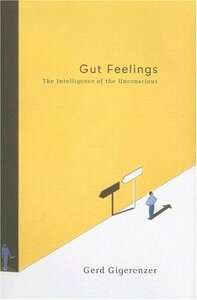Take a photo of a barcode or cover
Interesting investigation into intuition and gut feelings by one of Malcolm Gladwell's resources for Blink. If you were interested in understanding more about how gut feelings or intuition really works, this is an easy-to-read, interesting primer. Overall my takeaway was that we should learn to listen more to our initial gut feelings when faced with major decisions. The unconscious knows a lot more than we might give it credit for and paying heed to that upset stomach might be wise. Is it just indigestion? Nerves? Or is it the sinking feeling that you're headed down the wrong path?
My favorite sections are the ones where the author describes actual versus perceived decision-making practices in cardiac emergency situations and English magistrates. The "frugal" decision trees are illuminating in that they show we intuitively use a very simple decision-making process in complex situations, and this works the majority of the time. It is when we try to lay on complex processes for complex situations where issues and problems can arise. Although we like to believe we're driving the bus, this book provides evidence that our subconscious is facilitating more in our day-to-day world than we can perceive.
An added bonus is the author's explanation of human behavior in difficult situations, especially work-related and collaborative settings.
Although I read this over a period of weeks due to travel, etc., you could easily put it away in a couple of afternoons.
My favorite sections are the ones where the author describes actual versus perceived decision-making practices in cardiac emergency situations and English magistrates. The "frugal" decision trees are illuminating in that they show we intuitively use a very simple decision-making process in complex situations, and this works the majority of the time. It is when we try to lay on complex processes for complex situations where issues and problems can arise. Although we like to believe we're driving the bus, this book provides evidence that our subconscious is facilitating more in our day-to-day world than we can perceive.
An added bonus is the author's explanation of human behavior in difficult situations, especially work-related and collaborative settings.
Although I read this over a period of weeks due to travel, etc., you could easily put it away in a couple of afternoons.
informative
The book is fun and informative. It starts to loose focus towards the end of the later half though.
funny
informative
medium-paced
Thoroughly enjoyed the information. The author was humorous at times which made it feel much faster. Great topic.
So, if you want to save yourself the time and expense of taking a Cognitive Science 101 course, this book is a pretty good solution. Gigerenzer offers up some theories on how human decision-making actually works (hint: it's not by drawing up a big list of pro's and con's and doing a weighted analysis), why we evolved to make decisions this way (VOMIT. instant -1 star.), and presents evidence that these innate methods of decison-making are often "better" than advanced statistical models.
The first third of the book was basically a primer in how corporations exploit the recognition heuristic to promote sales and brand loyalty, by plastering their logo on every imaginable surface because humans are more likely to "like" or "buy" something they recognize over an unknown. Only Gigerenzer didn't explain it like that, he was actually talking about the processes that inform intuitive, morally-neutral decision making... I just can't read a book morally-neutrally.
Listen, this book is fine. I'm sure the science behind it is solid and I think Malcolm Gladwell used it as a jumping-off point more than once. Reading it just made me uneasy because once the more we understand about the way people make gut decisions, the more that understanding will be exploited. Which could be a good thing! Gigerenzer even gives some examples of how it could be a good thing, like how it could increase the percentage of organ donors or help doctors better prioritize the symptoms and care of patients! But I am forever cynical, and read this whole book thinking about how it gets easier every day for those with power to subtly control those without power.
In conclusion, this book made me sad in ways a book of statistically-driven, non-narrative nonfiction should not. But the processes of intuition described in this book are probably things we should know about ourselves, and things we should call out corporations/the government/etc for exploiting.
[Today's review brought to you by the word "exploit" and the number "paranoia.":]
The first third of the book was basically a primer in how corporations exploit the recognition heuristic to promote sales and brand loyalty, by plastering their logo on every imaginable surface because humans are more likely to "like" or "buy" something they recognize over an unknown. Only Gigerenzer didn't explain it like that, he was actually talking about the processes that inform intuitive, morally-neutral decision making... I just can't read a book morally-neutrally.
Listen, this book is fine. I'm sure the science behind it is solid and I think Malcolm Gladwell used it as a jumping-off point more than once. Reading it just made me uneasy because once the more we understand about the way people make gut decisions, the more that understanding will be exploited. Which could be a good thing! Gigerenzer even gives some examples of how it could be a good thing, like how it could increase the percentage of organ donors or help doctors better prioritize the symptoms and care of patients! But I am forever cynical, and read this whole book thinking about how it gets easier every day for those with power to subtly control those without power.
In conclusion, this book made me sad in ways a book of statistically-driven, non-narrative nonfiction should not. But the processes of intuition described in this book are probably things we should know about ourselves, and things we should call out corporations/the government/etc for exploiting.
[Today's review brought to you by the word "exploit" and the number "paranoia.":]
informative
inspiring
lighthearted
medium-paced
informative
medium-paced
This pretty much sums the book up:
"...Gut feelings are in fact neither impeccable nor stupid. As I have argued, they take advantage of the evolved capacities of the brain and are based on rules of thumb that enable us to act fast and with astounding accuracy. The quality of intuition lies in the intelligence of the unconscious: the ability to know without thinking which role to rely on in which situation...there is no way around intuition; we could achieve little without it." (p228-229)
"...Gut feelings are in fact neither impeccable nor stupid. As I have argued, they take advantage of the evolved capacities of the brain and are based on rules of thumb that enable us to act fast and with astounding accuracy. The quality of intuition lies in the intelligence of the unconscious: the ability to know without thinking which role to rely on in which situation...there is no way around intuition; we could achieve little without it." (p228-229)
Wonderful topic. Some chapters were remarkably insightful. However, much of the book felt long-winded and dived too deep into various experiments and theories to prove the central tenet of the book, that humans rely on simple rules of thumb and basic heuristics even when making complex decisions. Evolution has created powerful internal capacities to make complex decisions, quickly.


